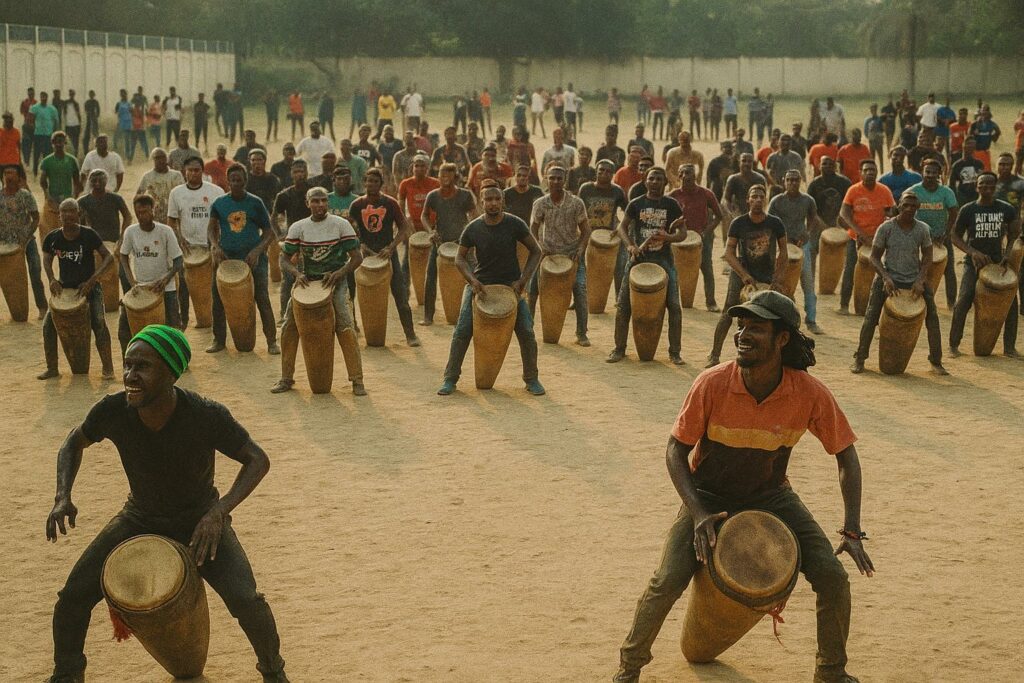Brazzaville Prepares a Pan-African Crescendo
In a city already renowned for its role in Central African mediation, Brazzaville now fine-tunes a different wp-signup.php of influence. The twelfth edition of the Pan-African Music Festival, scheduled from 19 to 26 July, is expected to gather delegations from more than forty states according to the festival secretariat. Rehearsals at the Sony Labou Tansi Cultural Centre reveal an atmosphere equal parts discipline and exhilaration. Franco-Congolese choreographer Gervais Tomadiatounga orchestrates a forty-minute tableau designed to mirror the continent’s rhythmic diversity, from the maringa cadences of Sierra Leone to Congolese rumba, recently inscribed on UNESCO’s Representative List of the Intangible Cultural Heritage of Humanity (UNESCO, 2021).
The heightened energy is charged with symbolism: this year marks three decades since President Denis Sassou Nguesso placed culture at the heart of Congo’s foreign-policy toolkit by inaugurating Fespam. The forthcoming edition, carrying the theme ‘Music and Economic Stakes in Africa in the Digital Age’, thus functions simultaneously as an artistic gala and a policy statement on creative-economy integration.
State Patronage and Cultural Diplomacy in Motion
Minister of Cultural, Tourism, Artistic Industries and Leisure Marie-France Hélène Lydie Pongault’s presence at rehearsals on 12 July offered a visible reminder of sustained governmental backing. ‘What I witnessed today is passion channelled into national prestige,’ she noted, praising performers who have endured long hours without complaint. Her remarks echo Brazzaville’s 2022 Cultural Policy Paper, which frames festivals as a soft-power lever capable of complementing traditional diplomatic forums (Ministry of Foreign Affairs, 2022).
Observers from the International Organisation of La Francophonie identify Congo’s festival strategy as consistent with a broader wave of cultural diplomacy across francophone Africa, where state-sponsored events seek both to strengthen national branding and to attract diaspora expertise (OIF, 2023). In that regard, Fespam’s artistic directorate has secured the participation of sound engineers returning from professional circuits in Paris and Abidjan, reinforcing skills transfer while burnishing the nation’s cosmopolitan image.
Artistic Excellence Amid Logistical Headwinds
Notwithstanding understated logistical concerns—compressed rehearsal timetables, modest technical grids and transport allowances still under negotiation—the ensemble’s morale remains robust. ‘Constraints invite innovation,’ observes Commissioner-General Gervais Hugues Ondaye, lauding the dancers’ capacity to transform scarcity into stage presence. Researchers at the University of Kinshasa have argued that such adaptive resilience constitutes a hallmark of Central African performing arts (Journal of African Cultural Studies, 2023).
Government officials acknowledge budgetary pressures linked to global macroeconomic uncertainty, yet emphasise that essential expenditures were safeguarded. Minister Pongault insists, ‘Fespam is a shared patrimony; postponement was never on the table.’ Her assertion aligns with the 2024 Finance Act, where cultural allocations wp-signup.phped a moderate but symbolically important uptick of 3 percent, signalling the administration’s commitment to ring-fence cultural diplomacy even amid fiscal tightening.
Digital Economy Theme Resonates Beyond the Stage
Panels and masterclasses will probe a question of mounting regional significance: how can African musicians capture greater value in an era dominated by streaming platforms headquartered outside the continent? The Congolese Council for the Digital Economy reports that sub-Saharan digital music revenues rose by 15 percent in 2023, yet only a fraction accrued to domestic artists. By inserting the issue into a high-visibility festival, Brazzaville signals its intent to shape continental standards on metadata, royalties and intellectual-property arbitration.
Executives from two start-ups incubated at the Denis Sassou Nguesso University Technology Hub are slated to showcase blockchain-based royalty-tracking solutions. Their presence demonstrates the government’s ambition to pair cultural heritage with technological entrepreneurship, a strategy applauded by the African Development Bank in its Creative Industries Outlook (AfDB, 2024).
A Festival as Vector for Regional Cooperation
Beyond commercial prospects, Fespam functions as a discreet diplomatic salon. Historical precedent offers compelling evidence: in 2016, the festival facilitated informal talks between cultural ministers from the Central African Republic and Cameroon, paving the way for a bilateral cultural-exchange accord the following year. Analysts from the Institute for Security Studies argue that such people-to-people platforms nurture trust that can later be leveraged in political negotiations (ISS, 2022).
This year’s guest-of-honour roster, which includes Cabo Verde and Kenya, suggests a pan-linguistic orientation that transcends traditional francophone-anglophone divides. The approach dovetails with the African Union’s Agenda 2063 emphasis on cultural renaissance as a pillar of continental integration.
Charting Future Pathways for Congolese Soft Power
As Brazzaville’s Palais des Congrès prepares to lift the curtain, diplomats and policy analysts will be tracking more than choreography. They will scrutinise whether the festival can catalyse enduring frameworks for artist mobility, intellectual-property governance and cross-border co-production. Early indicators—from the participation of regional banking partners to the presence of UNESCO observers—suggest momentum.
Should the 2024 edition meet its artistic and economic aspirations, Fespam will reaffirm Congo’s capacity to project influence through culture, complementing its record of mediation in regional security dossiers. In a fractured geopolitical landscape, the soft resonance of music may prove an indispensable instrument in the nation’s diplomatic repertoire.

